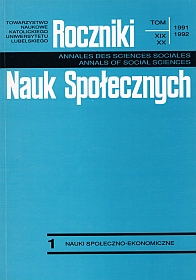The Evolution of the Social Question from Rerum novarum to Centesimus annus
Abstract
According to the author the social question consists in a critical evaluation in the light of the ethico-social principles of the social status of various categories of groups of social strata within the State. It also deals with poverty, wrongs and injustice in the world as well as gives some practical hints on how to overcome those situations by means of establishing order within a State and peace in the world. The question contains two aspects: negative and positive. The social question in the papal encyclical deals above all with the Church's reaction to the extant situations in various domains of life and her participation in tackling pressing problems in social life. The social teaching of the Church cannot be separated from the social question. The author talks even about a feedback. The Church fulfils a prophetic and critical role (SRS no 41).
For a long time the social question meant slavery and serfdom, and proletarism in the nineteenth century.
According to the author Leon XIII did not condemn capitalism but favoured its evolutional transformation on the basis of justice; he rejected the way in which socialism wanted to solve the working class question. For a long time the social question was taken as a question of a single country in the „class” dimension. Starting from Pius XII the social problems are read out in the all-world scale − one needs international cooperation and a care for peace. Further documents of the Magisterium of the Church touch upon the international and national problems (Mater et Magistra, Pacem in terris) or world problems (Populorum progressio, Sollicitudo rei socialis). The author sees an evolution in the social teaching of the Church as a transformation from the object-oriented approach (eg paying attention to the so-called intermediate structures) to the subject-oriented approach (the dignity of the human person, man's rights) and personalistic approach. Gaudium et spes emphasizes that „the person is and should be principle, subject and aim of all social regulations...” (25). Paul VI stresses that development should be integral and should serve every man. John Paul II developed the personalistic orientation, treating man as „the first and principal” way not only for lay institutions but also for the Church.
Since Mater et Magistra the stress has been laid not only on the social teaching of the Church but also on the formation to action in line with the Joc method: examine − evaluate − act.
The author perceives an evolution in the social teaching of the Church as to the manner in which labour and capital are understood. From Leon XIII up to Vatican Council II these two values were put at one level. Since the Council the priority of labour over capital has been clearly stressed. It is most conspicuous in Laborem exercens. The author emphasizes that capitalism and socialism did not contribute to the liberation of human labour but rather to its constraint. The fact that labour has been given priority over capital the author calls labourism.
Grasping solidarity not only as an ethico-social norm but also as a social fact is novelty in the social teaching of the Church.
Copyright (c) 1992 Roczniki Nauk Społecznych

This work is licensed under a Creative Commons Attribution-NonCommercial-NoDerivatives 4.0 International License.


